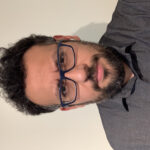Meet a Fellow: Miguel Ángel Chávez
 Miguel Ángel Chávez is the 2021-2022 William J. Vaughn Fellow at the RPW Center and the J. Léon Helguera Graduate Fellow in the Department of History. His research traces the evolution of British geography from 1830 to 1935.
Miguel Ángel Chávez is the 2021-2022 William J. Vaughn Fellow at the RPW Center and the J. Léon Helguera Graduate Fellow in the Department of History. His research traces the evolution of British geography from 1830 to 1935.
What is your research about and why does it matter?
Broadly speaking, my research looks at the trajectory of disciplinary geography in Britain from 1830 to 1935, using the case study of Nile and African exploration.
First, I examine the methods and strategies used by field geographers (otherwise known as “explorers”) to bolster their authority as “men of science,” in an age when scientific authority came from so-called “gentlemanly scientists.” Second, I look at how the Royal Geographical Society served as a node of transnational networks of scientific and financial support, offering material support and credibility to field geographers. Finally, I examine the legacy and continuities of field geography in the case of the Wellcome Tropical Research Laboratory in Khartoum, operating from 1903-1935.
While Baker had published his diaries for a broader audience on his return to Britain, seeing what was included in the original, unpublished manuscript revealed the omissions in his published diaries. This contrast brought to mind my readings, done under my former advisor, regarding the ways in which scientists fashioned their personas for professional and public audiences.
My hope is that this study will complicate our understanding of disciplinary geography by showing how developments in this discipline presaged the public-private relationship that typified scientific research in the twentieth century. That despite the romanticism associated with field geographers like Speke, Burton, and Livingstone, that geography was undergoing the same process of professionalization that typified laboratory sciences of the industrializing world.
Describe a discovery or a moment in your research that excited you.
I felt my first year in grad school was a bit lackluster, due, in part, with me not knowing where I wanted to take my research. Over the summer of 2017, I travelled to London to research at the archive of the Royal Geographical Society, mainly pouring over the expeditionary diaries of Samuel White Baker, written between 1861 and 1865.
While Baker had published his diaries for a broader audience on his return to Britain, seeing what was included in the original, unpublished manuscript revealed the omissions in his published diaries. This contrast brought to mind my readings, done under my former advisor, regarding the ways in which scientists fashioned their personas for professional and public audiences. This notion of self-fashioning (in the context of science studies) proved a useful avenue to study how geographers and travellers presented themselves to metropolitan audiences as authoritative voices in the geographical debates of Victorian Britain.
Since then, my research has shifted to look at the trajectory of British geography writ large. Nonetheless, making this observation in my first foray in archival research did lead me to formulate a question about self-fashioning among British adventurers and travellers in Africa. And that was what I was missing: a question. It was only then, in observing the discrepancy in Baker’s published and unpublished diaries, that my research project was able to take off.
What was your first job, and what lessons did you learn from it?
Sisyphean and laborious, the daily act of pushing shopping carts gave me the space to think about my lot in life. You learn a lot about people doing this job, everything from dealing with capricious managers who thought of me as expendable to supportive coworkers encouraging me to carry forward with my schoolwork.
I moved back with my family after dropping out of my dream school, due to poor academic performance exacerbated by my troubles with social anxiety and persistent panic attacks. Humiliated by that experience, I nonetheless took a job as a cart pusher at a Walmart in Plano, TX, to pay my way through community college. In and of itself, this job was not a panacea for my academic struggles or for my mental health. But the job was important in instilling a sense of humility in me, helping me to move forward with my life.
Sisyphean and laborious, the daily act of pushing shopping carts gave me the space to think about my lot in life. You learn a lot about people doing this job, everything from dealing with capricious managers who thought of me as expendable to supportive coworkers encouraging me to carry forward with my schoolwork. I felt a sense of calm doing that job that I had not felt in a long while. The work schedule provided the grounding I needed to continue with my school work.
While I only had this job for a year, the job was a turning point in my life. I was able to pick myself up and continue forward despite the setback. That’s all we can do, right?
Miguel Ángel Chávez is a PhD candidate in History at Vanderbilt University. He is both a William J. Vaughn Graduate Fellow at the Robert Penn Warren Center, as well as the J. Léon Helguera Graduate Fellow at the History Department. He received both his MA and BA in History from the University of North Texas in 2015 and 2011, respectively.
His dissertation, Professionalizing Science, traces the evolution of British geography from 1830 to 1935. His study examine the ways in which geographers presented themselves as men of science; how they leveraged institutional support from the Royal Geographical Society; and how the work of field scientists in 20th-century Sudan echoed the moralizing mission of the heyday of Nile exploration.
